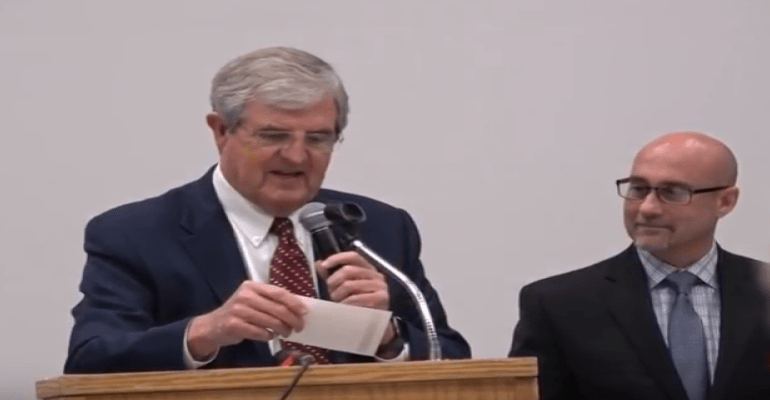
After taking a pounding the past months by Pima County residents frustrated with the extravagant use of HURF money for anything but roads, County Administrator Chuck Huckelberry is touting the fact that at least the monies are be used in a legal manner.
No one has ever questioned whether or not Huckelberry has used the HURF (Highway User Revenue Fund) money legally, however, there a growing segment of the population questioning why Huckelberry insists on using the monies for speculative projects while ignoring the failing roads.
Pima County Supervisor Ally has been the only member of the Board of Supervisors to question Huckelberry’s priorities and why the Arizona Legislature allows the use of HURF funds for frivolities.
As a result of the Legislature’s failure, Pima County Supervisors Richard Elias, Ramon Valadez, Sharon Bronson, and Steve Christy have rubber stamped risky projects like the expansion of Kino Sports Park soccer fields, as more and more roads fall into disrepair.
On Wednesday, Supervisor Miller addressed Huckelberry’s latest rationalization for the risky spending outlined in the memo dated December 26, “In the last fiscal year, Pima County received approximately $91 million in distributions for HURF/VLT from the state of AZ. As we all know, not even 10 percent of those monies have been allocated to road repairs for many years. Why not? The Arizona statutes don’t require that these monies be allocated to road repairs. Until those statutes are changed by our state legislature and signed into law by our Governor, the issue with diversion of these funds will continue. It is NOT illegal to divert these funds to pay salaries and overhead. The wisdom of the diversion of those funds is another story. We all know what years of these diversions have gotten us.”
“The solution to this problem would be to enact laws that state 100% of those funds must be used for direct road repairs along with an annual audit and enforcement provisions that would allow the state to withhold funds in the event they weren’t properly utilized for direct road repairs. If this happened, I suspect you would see a much downsized Department of Transportation along with a lot of road repairs. Interesting concept that our monies would be used as intended and government would be streamlined,” continued Miller.
“Over the years, Chuck Huckelberry has expanded the Pima County Department of Transportation to a budget of $43 million dollars, the bulk of which is funded with HURF/VLT monies. There is also approximately $18 million per year that is allocated to payoff HURF Revenue bonds approved by voters in 1997; the balance of funds are distributed to the general fund. Imagine if we used just that balance of approximately $30 mil per year on road repairs?”
“It isn’t difficult to understand that the Pima County Department of Transportation headcount of approximately 286 employees needs to be “right sized.” Pavement preservation efforts for Pima County have been outsourced to private contractors for years,” explained Miller. “I agree with this approach as the private sector is most often more efficient than government. As I presented in my alternate budget proposal last spring, for FY 2019 the Department of Transportation budget needs to be cut significantly and then these monies should be allocated directly to contracts for road repairs. Pima County has a fully staffed procurement department that executes the procurement efforts for road repairs. I have never understood the need for a department this size when the pavement preservation work is outsourced.”
Chuck Huckelberry and the majority on the board can’t seem to solve the problem. Their only solution to fixing the roads is to tax people more. That is wrong. This problem is easily solved if the will to do it is there. We all have decisions to make regarding our budgets each year; do we buy that new car, or do we fix the roof? One thing is certain, just because you can divert the money to the “nice-to-haves,” doesn’t mean you should.”
